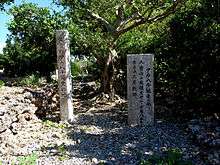Oyake Akahachi
Oyake Akahachi (遠弥計赤蜂[1]) was a Ryukyuan lord (aji) of Ishigaki Island who led a rebellion against the Ryukyu Kingdom in 1500.
Early life and rebellion
It is said that Akahachi was born on Hateruma Island, and that he was large and physically strong even as a child. He moved to Ishigaki Island as a young adult, and became the chief of Ōhama Village (today part of Ishigaki City) soon afterward.[2] His influence soon extended over all of Ishigaki Island, and beyond, to other islands in the Yaeyama Islands group. At some point late in the 15th century, the nearby Miyako Islands were divided between two influential families, the Nakasone and Kaneshigawa, who were fighting one another for dominance of the area. Seeking to take advantage of the chaos and disunity, Akahachi proposed an invasion of the Miyako Islands. However, Nakasone Toyomiya led a counterattack against Akahachi, overwhelming his forces and moving on to attack Yonaguni Island as well.[3]
At this time, the Ryukyu Kingdom, based at Shuri on Okinawa Island, did not yet have direct control over the Yaeyama or Miyako Islands, but merely expected tribute to be paid. Akahachi led the people of Ishigaki and the surrounding islands in revolt against the kingdom, refusing to pay taxes or tribute. After Nakasone conquered Yaeyama, a force of roughly 3,000 Ryukyuan troops was sent by King Shō Shin in 1500, and the rebellion was suppressed with the annexation of the Sakishima Islands.[2]
Legacy

While official records and histories produced by the Ryukyu Kingdom label Oyake Akahachi as a rebel and a traitor, locally on Ishigaki and the surrounding islands he is known as a hero who sought to secure their freedom and independence.[2] A stele in his honor can be found today in the Ōhama area of Ishigaki City.
References
- ↑ Shinzato, Keiji et al. Okinawa-ken no rekishi (History of Okinawa Prefecture). Tokyo: Yamakawa Publishing, 1996. p57.
- 1 2 3 "Oyake Akahachi." Okinawa rekishi jinmei jiten (沖縄歴史人名事典, "Encyclopedia of People of Okinawan History"). Naha: Okinawa Bunka-sha, 1996. p18.
- ↑ Kerr, George. Okinawa: the History of an Island People. (revised ed.) Tokyo: Tuttle Publishing, 2000. p121.